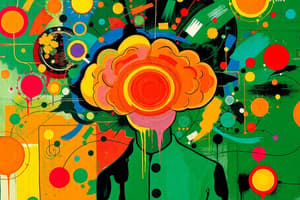Podcast
Questions and Answers
What is considered a key aspect of mental health?
What is considered a key aspect of mental health?
- Total independence from social environments
- The absence of biological function
- Negative psychological assessment
- Positive existence in biological, psychological, and social aspects (correct)
Which of the following statements accurately describes psychological disorders?
Which of the following statements accurately describes psychological disorders?
- They result from a failure in any of the biological, psychological, or social domains. (correct)
- They can only be identified through physical symptoms.
- They imply a total lack of cognitive function.
- They exclusively arise from biological dysfunction.
Which of these functions is classified as a complex psychological function?
Which of these functions is classified as a complex psychological function?
- Attention
- Memory
- Perception
- Intelligence (correct)
Which cognitive function is primarily involved in interacting with the environment?
Which cognitive function is primarily involved in interacting with the environment?
How is the concept of 'self' primarily defined in relation to higher brain functions?
How is the concept of 'self' primarily defined in relation to higher brain functions?
Which brain region is primarily responsible for activating the reticular activating system and regulating consciousness?
Which brain region is primarily responsible for activating the reticular activating system and regulating consciousness?
Which neurotransmitter is predominantly involved in the promotion of wakefulness?
Which neurotransmitter is predominantly involved in the promotion of wakefulness?
What is the significance of sleep in terms of brain activity?
What is the significance of sleep in terms of brain activity?
Which sense organ is primarily linked to the reticular activating system in maintaining consciousness?
Which sense organ is primarily linked to the reticular activating system in maintaining consciousness?
Which neurotransmitter is primarily associated with sleep regulation?
Which neurotransmitter is primarily associated with sleep regulation?
What is the primary focus of brain activities according to the provided information?
What is the primary focus of brain activities according to the provided information?
Which statement best captures the significance of brain activities in relation to mental health?
Which statement best captures the significance of brain activities in relation to mental health?
What misconception about brain activities is addressed in the information?
What misconception about brain activities is addressed in the information?
Which of the following is NOT implied by the information regarding brain activities?
Which of the following is NOT implied by the information regarding brain activities?
Why is it incorrect to view brain activities solely as negative?
Why is it incorrect to view brain activities solely as negative?
What role does consciousness play in psychological functions?
What role does consciousness play in psychological functions?
Which statement best describes consciousness based on its relation to psychological functions?
Which statement best describes consciousness based on its relation to psychological functions?
How does the state of consciousness affect the ability to perform psychological functions?
How does the state of consciousness affect the ability to perform psychological functions?
Which of the following statements about consciousness is NOT accurate?
Which of the following statements about consciousness is NOT accurate?
What implication can be drawn about the relationship between consciousness and psychological functions?
What implication can be drawn about the relationship between consciousness and psychological functions?
Flashcards
The Mind
The Mind
The higher mental functions of the nervous system, primarily the brain.
Mental Health
Mental Health
A state of positive well-being that encompasses biological, psychological, and social aspects of a person.
Mental Illness
Mental Illness
Disruption or imbalance in one or more of the biological, psychological, or social aspects of a person.
Simple Psychological Functions
Simple Psychological Functions
Signup and view all the flashcards
Complex Psychological Functions
Complex Psychological Functions
Signup and view all the flashcards
Consciousness
Consciousness
Signup and view all the flashcards
Psychological Functions
Psychological Functions
Signup and view all the flashcards
Psychological Functions Requiring Consciousness
Psychological Functions Requiring Consciousness
Signup and view all the flashcards
Consciousness and Psychological Functions
Consciousness and Psychological Functions
Signup and view all the flashcards
Consciousness as a Gateway
Consciousness as a Gateway
Signup and view all the flashcards
Sense organs
Sense organs
Signup and view all the flashcards
Reticular Activating System (RAS)
Reticular Activating System (RAS)
Signup and view all the flashcards
Cerebral Cortex
Cerebral Cortex
Signup and view all the flashcards
Hypothalamus
Hypothalamus
Signup and view all the flashcards
Neurotransmitters
Neurotransmitters
Signup and view all the flashcards
Brain Functions
Brain Functions
Signup and view all the flashcards
Brain Activities
Brain Activities
Signup and view all the flashcards
Essential Brain Functions
Essential Brain Functions
Signup and view all the flashcards
Importance of Brain Activities
Importance of Brain Activities
Signup and view all the flashcards
Brain Activities and Mental Health
Brain Activities and Mental Health
Signup and view all the flashcards
Study Notes
Introduction to Psychology of Consciousness
- Consciousness is the state of awareness of oneself and the surrounding environment.
- It is crucial for performing psychological functions.
- Dysfunction in consciousness can hinder various psychological processes.
Mental Functions
- Mental functions are categorized into simple and complex.
Simple Mental Functions
- Awareness
- Attention
- Perception
- Memory
- Emotions
- Thinking
- Movement
- Speech
Complex Mental Functions
- Understanding one's environment
- Learning
- Making judgments
- Cognitive ability
The Nervous System and Consciousness
- The nervous system, particularly the brain, plays a critical role in consciousness.
- Sense organs receive external stimuli.
- The reticular activating system (RAS) in the brain stem regulates alertness.
- The cerebral cortex is the primary area for cognitive processing.
- The hypothalamus is involved in regulating arousal and sleep-wake cycles.
- Different neurotransmitters, such as adrenaline, noradrenaline, serotonin, and melatonin, influence consciousness.
Sleep and Dreams
- Sleep is essential for mental health because of its restorative role.
- Sleep represents a significant portion of brain activity.
- Dreams are mental images experienced during sleep, important for memory processes.
- Dreams have different functions, like memory consolidation, emotional processing, and anticipatory thinking.
- Sleep stages (NREM and REM) reveal varying levels of consciousness.
Dream Sources
- Dreams originate from external/internal stimuli.
- Memories from past experiences and daily activities.
- Desires, wishes, fears, and other subconscious elements influence dreams.
- The dream work involves processes such as symbolization, condensation, displacement, and projection. This is how subconscious material shows up in the dream.
Dream Functions
- Memory consolidation
- Emotional processing
- Wish fulfillment
- Warning of potential problems
- Maintaining sleep.
- Anticipation of future events
Sleep Stages
- NREM sleep (non-rapid eye movement): Also called quiet or deep sleep, divided into stages with different brainwave patterns. It is divided into four stages.
- REM sleep (rapid eye movement): characterized by vivid dreaming and increased brain activity.
Factors Affecting Dream Recall
- The timing of awakening (closer to REM sleep = better recall)
- Duration of sleep
- Individual differences influence remembering dreams.
Studying That Suits You
Use AI to generate personalized quizzes and flashcards to suit your learning preferences.





